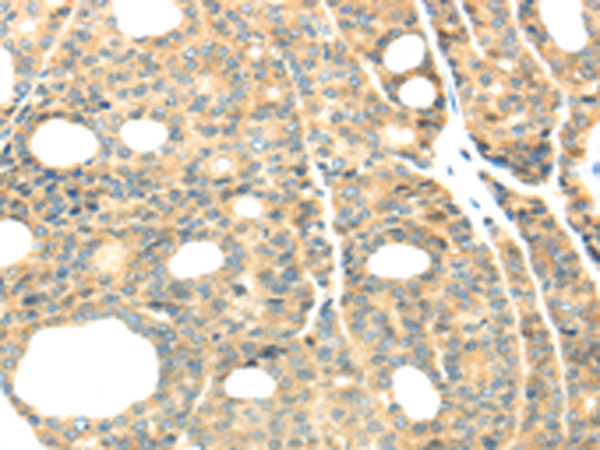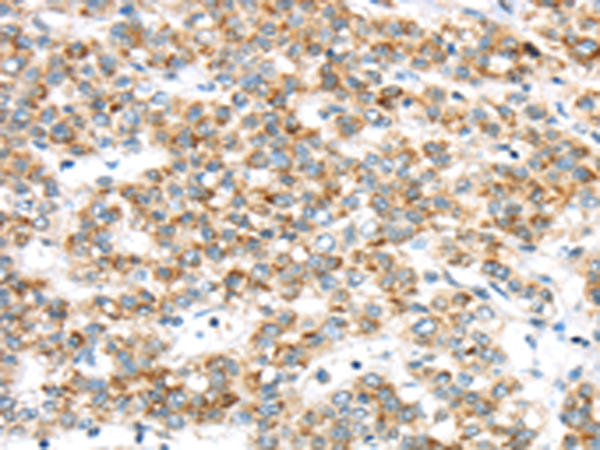

| WB | 咨询技术 | Human,Mouse,Rat |
| IF | 咨询技术 | Human,Mouse,Rat |
| IHC | 1/30-1/150 | Human,Mouse,Rat |
| ICC | 技术咨询 | Human,Mouse,Rat |
| FCM | 咨询技术 | Human,Mouse,Rat |
| Elisa | 1/2000-1/10000 | Human,Mouse,Rat |
| Aliases | TTBK; SCA11 |
| Host/Isotype | Rabbit IgG |
| Antibody Type | Primary antibody |
| Storage | Store at 4°C short term. Aliquot and store at -20°C long term. Avoid freeze/thaw cycles. |
| Species Reactivity | Human, Mouse |
| Immunogen | Synthetic peptide of human TTBK2 |
| Formulation | Purified antibody in PBS with 0.05% sodium azide and 50% glycerol. |
+ +
以下是3篇涉及TTBK2抗体的研究文献及其简要摘要:
1. **文献名称**: "Tau-tubulin kinase 2 (TTBK2) promotes tau aggregation and neurodegeneration"
**作者**: Sato S. et al.
**摘要**: 该研究使用TTBK2特异性抗体检测神经元中TTBK2的表达,发现其过度表达导致tau蛋白异常磷酸化及聚集,加速神经退行性变,提示其在阿尔茨海默病中的作用。
2. **文献名称**: "TTBK2 regulates ciliogenesis and phosphorylates multiple centrosomal proteins"
**作者**: Goetz S.C. et al.
**摘要**: 通过Western blot和免疫荧光技术结合TTBK2抗体,证明TTBK2通过磷酸化中心体蛋白调控纤毛形成,揭示了其在细胞周期及发育中的关键功能。
3. **文献名称**: "Antibody-based profiling reveals tissue-specific expression of TTBK2 isoforms"
**作者**: Li X. et al.
**摘要**: 研究利用多克隆TTBK2抗体分析小鼠组织,发现TTBK2存在不同剪接异构体,且在大脑、睾丸中高表达,提示其组织特异性功能差异。
4. **文献名称**: "Inhibition of TTBK2 kinase activity reduces pathological tau accumulation"
**作者**: Hernandez F. et al.
**摘要**: 采用TTBK2抗体验证基因敲除模型中的蛋白水平,发现抑制TTBK2激酶活性可降低tau病理沉积,为靶向治疗tau病变提供依据。
以上文献均通过TTBK2抗体进行蛋白定位、表达水平或功能验证研究,涉及神经退行疾病机制及细胞生物学过程。
TTBK2 (Tau-tubulin kinase 2) is a serine/threonine kinase belonging to the casein kinase 1 (CK1) superfamily. It is primarily recognized for its role in phosphorylating tau and tubulin proteins, influencing microtubule dynamics and stability. TTBK2 is implicated in neurodegenerative diseases, particularly Alzheimer’s disease, where hyperphosphorylation of tau leads to neurofibrillary tangle formation, a hallmark of the condition. Beyond neurodegeneration, TTBK2 is essential for ciliogenesis, regulating the formation and maintenance of primary cilia—critical sensory organelles in cells. Mutations in the *TTBK2* gene are linked to spinocerebellar ataxia type 11 (SCA11), a rare autosomal dominant disorder characterized by progressive motor coordination deficits.
Antibodies targeting TTBK2 are vital tools for studying its expression, localization, and activity in biological systems. They enable detection of endogenous TTBK2 in tissues or cultured cells via techniques like Western blotting, immunohistochemistry, and immunofluorescence. These antibodies also aid in investigating post-translational modifications, kinase-substrate interactions, and pathological mechanisms in disease models. Commercial TTBK2 antibodies are typically raised against specific epitopes, such as the kinase domain or C-terminal regions, and are available in monoclonal or polyclonal formats. Validation includes testing for specificity using knockout controls or siRNA-mediated knockdown. Research utilizing TTBK2 antibodies continues to advance understanding of its dual roles in neurodegeneration and ciliary biology, offering potential therapeutic insights.
×